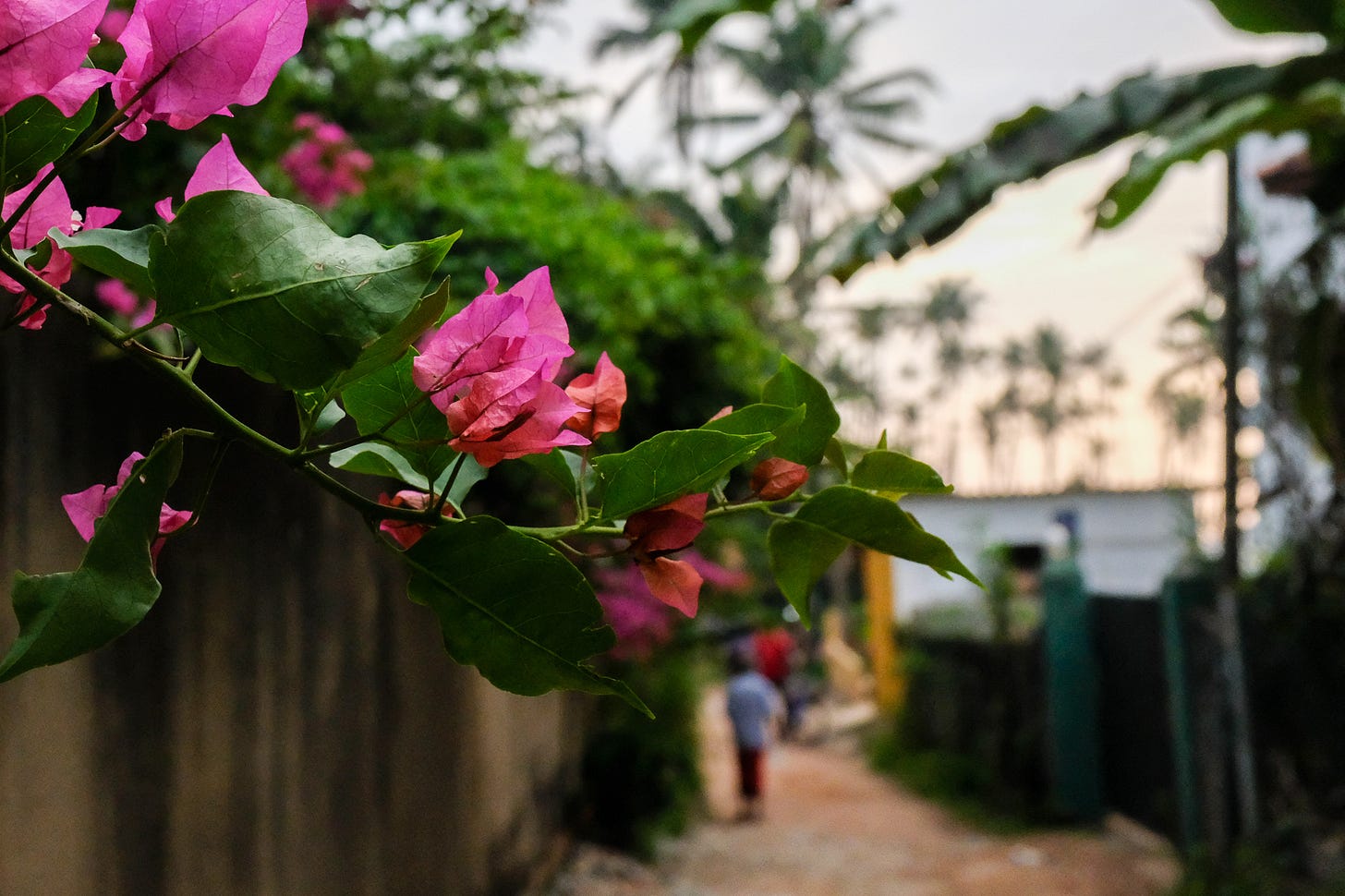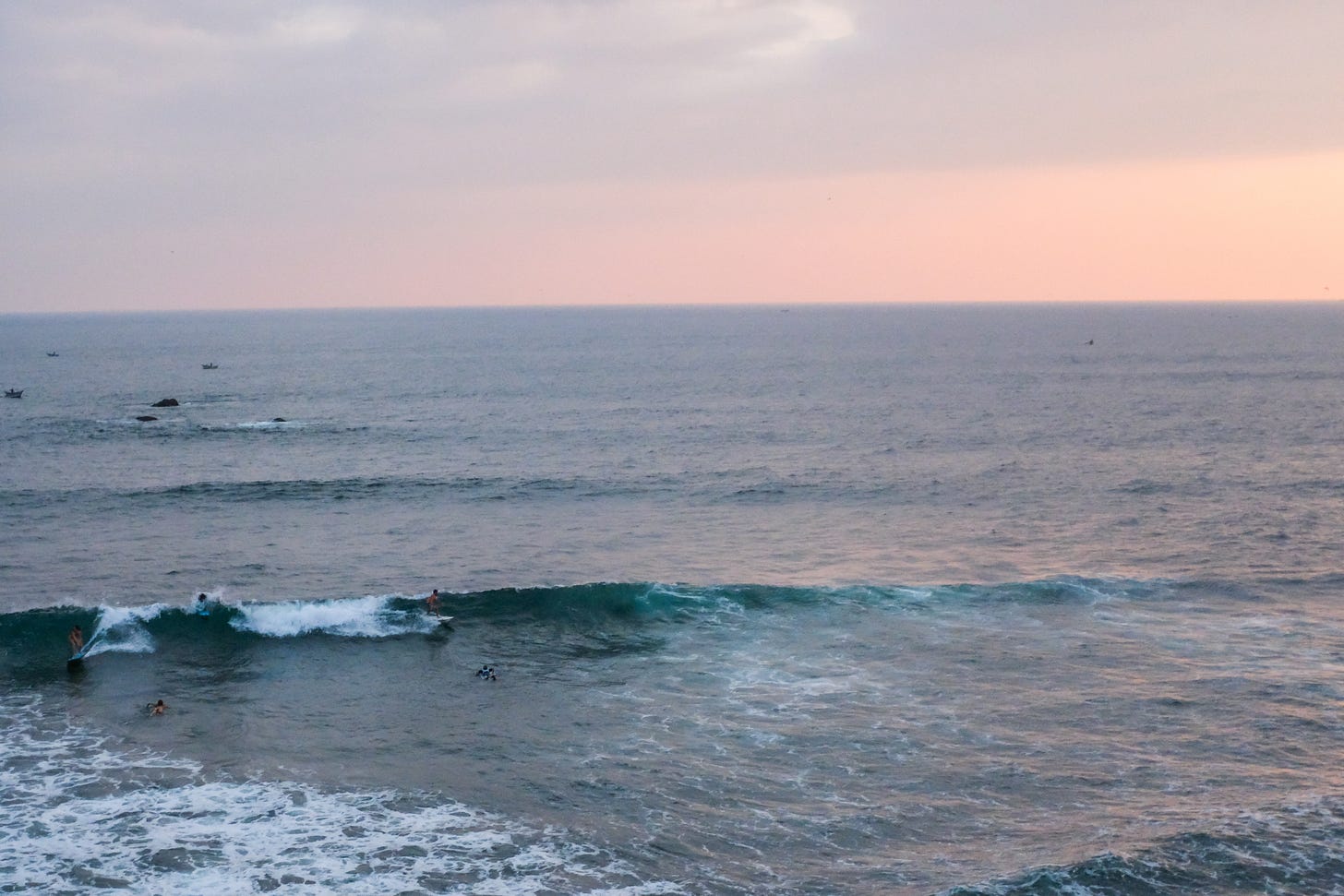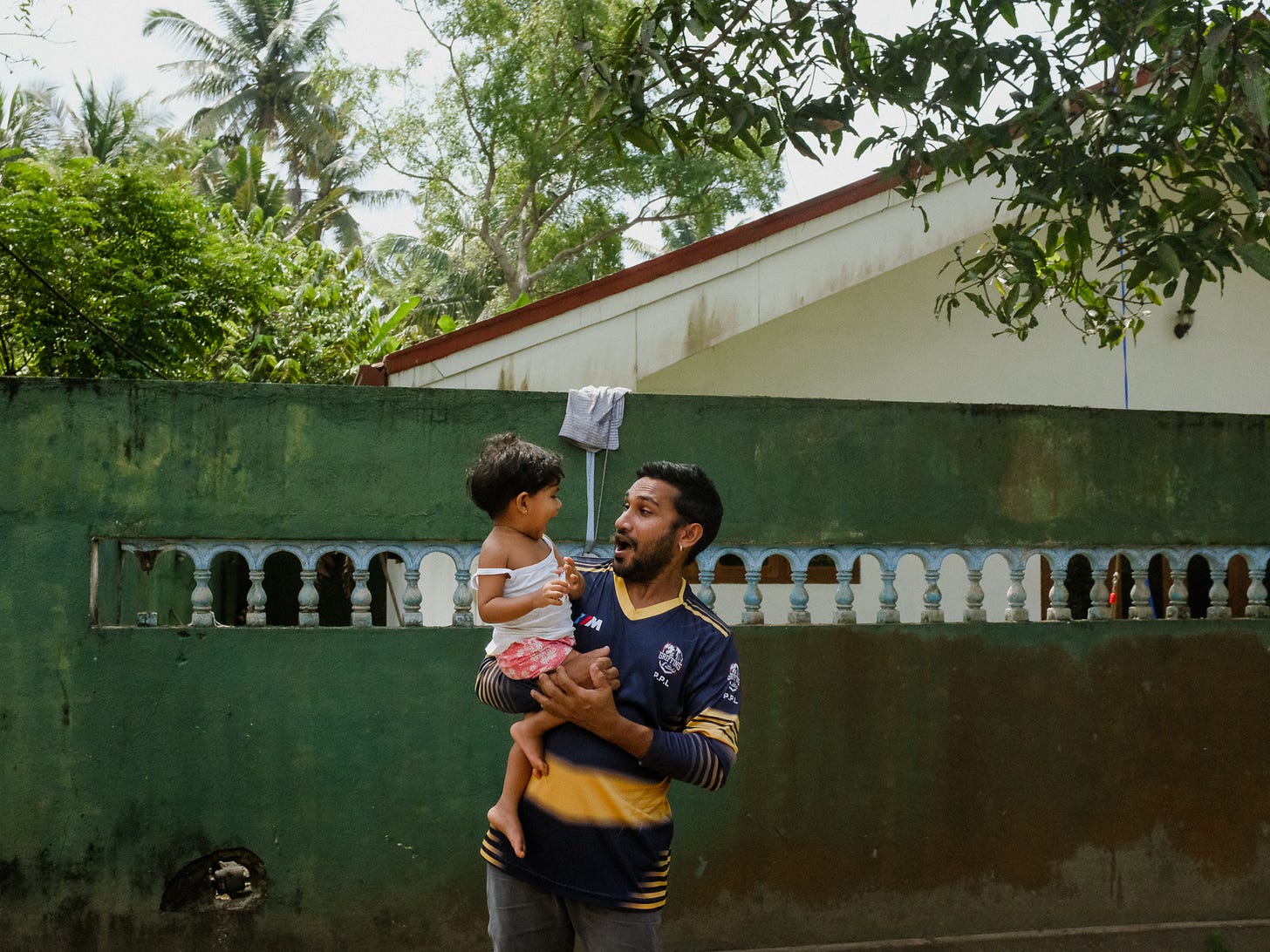in praise of openness 🌺
a postcard from Sri Lanka
From the moment I land in Sri Lanka, I am overwhelmed and unprepared. At the airport I Google “Sri Lanka currency” and how to say thank you in Sinhala, which I have only just learned is the primary language.
It’s a good thing, I tell myself, to show up without expectations. For once, I did not over-prepare. But there is a line between openness and ignorance, and I’m dancing on it. It’s rude to know nothing about a place you choose to visit, as though you expect to be accommodated.
Openness, unlike ignorance, takes work.
Our trip begins in Colombo, the capital city. On the first night I take it all in: dizzy roundabouts and mirrored high-rises, roti carts and lottery stalls, boys playing cricket in the heat. Giant bats fly low and slow, their wings stretching three or four feet across. One old man feeds another, scooping palmfuls of yellow rice from a banana leaf. The air is humid, even after the rain.
From Colombo we take the train along the coast, to the old fort of Galle. The station is packed, and we don’t know where to pick up our tickets, and we wait in the wrong line. Once on the platform, there is jostling and confusion, no one quite sure where to stand.
A local guy strikes up a conversation, showing us a hole-punched paper bag that holds a live pigeon. “I’m not a beach boy,” he says, holding up the bag. “I’m a family man.” Before we can respond, a German man interrupts, telling us to move down, “where all the white people are.” He smirks and I am deflated to learn that it is, in fact, where we should wait for our car.
A woman with an English accent is relieved to find us, a group of sweaty westerners standing together. She has a second-class ticket but says she will try first-class anyway. A different English man, traveling alone, is shocked when the conductor tells him he needs a reservation. He is confused that he does not get first-class by default.
A Sri Lankan family sits in front of us. They have a toddler who the adults take turns holding. The little girl stares at us and waves. “Our country is beautiful,” her father says.
The train is slow enough to see every station, house, and yard we pass. A girl swings a cricket bat on the red dirt while her mom hangs laundry. A man sits on a roof eating mango. A boy leaps up to catch a plastic bag. Kids splash in brackish water, saree-draped women march home along the tracks.
I can almost touch the plumeria and hibiscus, the rambutan and banana, the delicate clusters of bougainvillea. For an hour we ride with the jungle on one side and the Indian Ocean on the other. It almost looks like an island I know.
We are in Sri Lanka for many reasons but mostly to surf. In Weligama, there are no local people in the water or on the sand, only the surf instructors. Young white people sit in cafes rolling cigarettes and eating smoothie bowls. Some will stay here all winter.
Surfing terrifies me, thrashes me in the sand, but I go anyway. It does not take courage, I tell myself. It takes resolve. Manju, our instructor, is a serious man with a long, sun-streaked beard and dark, intense eyes. “Paddling faster! Popping up faster! Bending your knees! Not looking down!” He loves a gerund.
The waves are easy to catch but difficult to paddle through. I collapse on my board when I make it past the break, admiring a rainbow behind the curve of the wave. Manju tells me I rode the last one a bit better. A bit.
“But you are scared of the big waves,” he says. “Why?”
“I’m not scared of the big waves,” I tell him. “I’m scared of all of them.”
We return to our guesthouse, wrung out but serene. My favorite aunty, always smiling, has breakfast ready: dal curry with coconut sambal and roti. She brings us seconds and threatens thirds. The next day we eat milk rice and spiced cubes of kiriya, for a Buddhist holiday. By a stroke of luck we catch the procession—it happens at dawn, just steps from our door. People dressed in white, carrying sweet offerings, following the beat of a drum.
We extend our stay, mostly to spend more time at this guesthouse, with this family. The grandmother chases purple-faced langurs from the breadfruit trees with a slingshot and laughs at my surprise. The two-year-old follows us around the yard, speaking in Sinhala. The language is melodic, gentle. I keep mixing up yes and no. She calls Tucker “maama,” repeating the word over and over. Uncle.
The train from Kandy to Ella is famous for its scenery: seven hours of mist-covered mountains, waterfalls, and terraced hillsides. There are no other foreigners in our car, and we make friends with a group of 20 Sri Lankans. There are five families and all of the mothers are friends. One of the husbands brings out a drum and everyone begins to clap and sing. They invite us to dance with them in the aisle. “Sing us one in English,” they say, but we demur.
The moms pass out snacks, the kids give us handfuls of crackers. One of them points out the towns we pass, another counts the stops we have left. They study English in school and speak it well. They ask about our favorite foods and sports and Disney princesses. They want to see pictures of our parents. One of the girls performs her favorite dance. She poses with arms lifted, hands fluttering like wings.
We take dozens of selfies with different phones. “For the good memories, no?” says one of the moms, who is maybe my age. As our stop approaches, the adults say goodbye. We hope to see them on another trip, another train. The kids line up in a row, faces serious, extending their hands for us to hold.
The day before leaving Sri Lanka, we trek through a forest preserve called Knuckles. Over eight miles, we see only one other hiker. We start in rice terraces with a backdrop of mist-covered mountains. A bright yellow butterfly lands in my hand.
Our guide, Nishantha, points out cardamom and clove and lemongrass, hawk eagles and parakeets and swifts. He takes us to an old couple’s home, a cottage built against a hillside. The mud wall is dotted with tiny holes—nests for the oriental dwarf kingfisher, a rare species just larger than a hummingbird, its plumage bright pink and blue.
Nishantha leads us through scrubland, a eucalyptus forest, and into the tea fields. He talks to the local people, translating Tamil into English. Women are hard at work picking tea leaves—their daily quota is 20 kilograms per person, and there is not enough to go around. We meet a young woman who has just returned from Kuwait, looking for work. She will try Malaysia next. We wave as she walks home, into a cluster of pastel-painted houses that overlooks one of the most beautiful views I have ever seen.
When Nishantha drives us back into Kandy, he swerves to avoid a dog running in the street. “You know, the dogs are not wild,” he says. “They live with someone, but in the daytime they are free.”
We have seen dozens, if not hundreds, of dogs on village roads and city sidewalks, uncomfortably close to the passing traffic.
“It is very different in your country, no?” he says. "The houses are closed. Windows shut, doors shut. Everyone stays inside.” I nod, thinking of the hermetic seal of a condo, the loneliness of a basement.
“In our country, never,” he says. “Have you seen? Open. Everything is always open.”
I will miss Sri Lanka. I am already nostalgic for the gentle chaos, the kids who wave from bikes and bus stops, the freedom of walking on train tracks and hanging out of open windows.
I wonder what will happen once we leave. I hope I will continue to exhale, to expand, to be humbled by waves and serenaded by strangers. But life is overwhelming, and my instinct has always been to retreat, withdraw, and make my world smaller.
I hope I can follow the example of people we've met. They face outward, I notice, toward family and community. Toward us, too.









I love, "the freedom of walking on train tracks and hanging from open windows." Beautifully simple.
Such serenity in your prose. XoXo